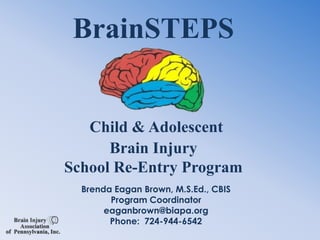
Brain injury school re-entry
- 1. BrainSTEPSChild & Adolescent Brain Injury School Re-Entry Program Brenda Eagan Brown, M.S.Ed., CBIS Program Coordinator eaganbrown@biapa.org Phone: 724-944-6542
- 2. BrainSTEPS Strategies Teaching Educators Parents Students
- 4. How Common is TBI in Children in Pennsylvania? Each year, approximately 26,000 children in Pennsylvania sustain a traumatic brain injury (mild, moderate, or severe) Majority of this number = Concussions! Source: The Brain Injury Association of Pennsylvania, 2008
- 5. In 2006 3,938 Children & Adolescents in Pennsylvania were HOSPITALIZED with TBI Source: The Pennsylvania Department of Health, 2006 DOES NOT INCLUDE EMERGENCY ROOM VISITS.
- 6. Statistics in Pennsylvania In one year (2006) the PA Department of Health recorded 3938 children ages 0-21, who were hospitalized with TBI. Children Discharged from Hospitals in PA with TBI Diagnosis: 3938 Number of students classified as TBI receiving Special Education as of the 2007-2008 PDE Report: 788
- 7. BrainSTEPSBrain InjurySchool Re-Entry ModelProgram
- 8. The BrainSTEPS Program Funded by a Title V, federal Maternal Child Health Block Grant, from the PA Department of Health. Partnered with the PA Department of Education, Bureau of Special Education Implemented by the Brain Injury Association of Pennsylvania - September 2007
- 9. What is BrainSTEPS? Brain injury consulting teams available to families and schools throughout Pennsylvania. Teams are extensively trained in the educational needs of students returning to school following brain injury. Teams will work with local school staff to develop educational programs, academic interventions, strategy implementation, and monitoring of students.
- 10. Team members provide training and consultation regarding Brain Injury: identification school re-entry planning IEP development intervention selection & implementation long-term monitoring
- 11. Pennsylvania’s BrainSTEPS Programis Considered a National Model for Brain Injury School Re-Entry!
- 12. December 2008,BrainSTEPS won the Award of Excellence for Programs & Services from the national Brain Injury Association of America&Brenda Eagan Brown was awarded the Pioneer in Brain Injury Award from the Brain Injury Association of Pennsylvania at the annual conference- June 2009
- 13. Maternal and Child Health Bureau, Health Resources & Services AdministrationReady, Set, Go: Including Children and Youth in TBI ProgramsPA’s BrainSTEPS Brain Injury School Re-Entry ProgramTuesday, June 17, 2008 http://www.mchcom.com/archivedWebcastDetailNewInterface.asp?aeid=456
- 14. BrainSTEPS Encompasses Acquired Brain Injuries Traumatic Brain Injuries – an injury to the brain caused by an external force Non-Traumatic Brain Injuries – an injury to the brain caused by an internal force Acquired Brain Injuries only occur AFTER the birth process.
- 20. BrainSTEPS Objectives 3. Partner with PA brain injury hospitals & rehabilitation providers to promote effective communication & consistent contacts between providers and educators to facilitate successful transition 4. Ensure that brain injured students re-entering school & those previously identified receive appropriate educations 5. Explore & direct families to community resources
- 21. BrainSTEPS Objectives 6. Participate in the student’s Regular or Special Education planning process. 7. Offer consistent ongoing consultation with teachers regarding educational program & strategies. 8. Train educational professionals on brain injury effects when a student in their school has been identified
- 22. Building Solid Collaborations & Partnerships THROUGHOUT Pennsylvania! There are currently 30solid partnerships that have been formed with community facilities, medical and rehab. centers, & government agencies. 19 of these organizations also have professionals on our BrainSTEPS teams!
- 23. 21 Active BrainSTEPS Teams Red, Yellow, Blue, Green= Trained & Functioning Brain STEPS Teams Purple =Teams will Train During Fall 2009
- 24. BrainSTEPS Team Members (2008-2009 School Year): 191
- 25. BrainSTEPS Team Members # of Attendees at BrainSTEPS Presentations over 5,000
- 26. Fall, 2009 – ORBS – Online Reporting BrainSTEPS through a partnership with PDE, BSE.
- 27. For More Information on the BrainSTEPS Program Contact: Brenda Eagan Brown, M.S.Ed., CBIS Program Coordinator BrainSTEPS Brain Injury School Re-Entry Program Brain Injury Association of Pennsylvania Phone: 724-944-6542 Email: eaganbrown@biapa.org
Hinweis der Redaktion
- Many individuals are left with significant educational, psychosocial, communicative and or health needs following a brain injury. Educators face the challenges they may not have encountered before. A student who was once healthy and self-sufficient may re-enter the public school system as a medically fragile stranger who is unable to walk, talk or eat without assistance. A student may return with numerous special learning needs. Another student with no obvious physical or cognitive deficit may return to school with a strangely altered personality. As the incidence of brain injuries continues to increase with higher survival rates, schools face a greater responsibility. Schools now have the great responsibility of being the ‘most appropriate’ place for children to gain reassurance that achievement is possible again, even while being confronted with enormous new difficulties in thinking, remembering, speaking, reading or concentrating.
- Injury to the brain AFTER the birth process.